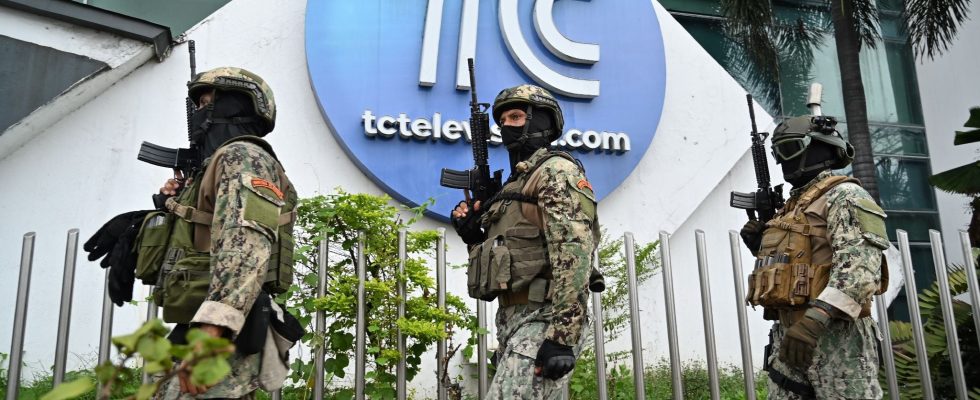The security situation is considered very worrying by the United States. The President of Ecuador, Daniel Noboa declared, Tuesday January 9, his country in a state of “internal armed conflict” and ordered the “neutralization” of criminal groups involved in drug trafficking, on the third day of an unprecedented security crisis which left at least 10 dead, according to an initial report. In a decree signed Tuesday, the president requested “the mobilization and intervention of the armed forces and the national police […] to guarantee sovereignty and national integrity against organized crime, terrorist organizations and non-state belligerents.
The state of emergency declared Monday by Daniel Noboa, elected in November on the promise of restoring security, extends to the entire territory and for 60 days. The army is thus authorized to maintain order in the streets (with a nighttime curfew) and prisons. It has clearly had little effect so far: numerous incidents, including the kidnapping of seven police officers, have also been reported across the country.
What is happening in Ecuador? L’Express takes stock.
What is the situation in Ecuador?
In the port city of Guayaquil, where criminal groups are all-powerful, the police chief said the violence left eight dead and three injured. Two police officers were also “viciously murdered by armed criminals” in the town of Nobol, near Guayaquil. The images broadcast on social networks, difficult to verify, give an idea of this violence and fuel the impression of chaos which is gradually settling in certain localities of the country: Molotov cocktail attacks, cars set on fire, random shootings at police officers, scenes of panic…
In the large port of Guayaquil, plunged into psychosis, many hotel establishments and restaurants have closed, while army vehicles patrol the streets, it has been noted. In the capital Quito, gripped by fear, stores and shopping centers also closed prematurely. In the evening, the Ministry of Education ordered the temporary closure of all schools in the country.
In the latest and spectacular episode, armed men burst into the set of a public television station in Guayaquil on Tuesday afternoon, briefly taking journalists and channel employees hostage. Amid the gunfire, the broadcast of these surreal images continued live for several minutes. Until, apparently, the police intervened shouting “Police! Police!”. No one was believed to have been killed or injured in the raid, and 13 attackers were arrested, police said.
Several mutinies and hostage-taking of guards took place in various prisons, all relayed by frightening videos broadcast on social networks showing captives threatened by the knives of masked inmates. On Tuesday, new videos emerged, this time showing the execution of at least two guards, by shooting and hanging. In a press release, the prison administration (SNAI) reported that 139 members of its staff are currently still held hostage in five prisons in the country. SNAI has not commented on the execution videos.
Why this violence in Ecuador?
These criminal gangs, most of them simple street gangs a few years ago, have become the bloody actors of drug trafficking with international tentacles, as Ecuador has established itself as the main point of export of cocaine. produced in neighboring Peru and Colombia.
Once a haven of peace, the country is today ravaged by the violence of these gangs.
Who is wanted?
Public enemy number 1, the leader of the Choneros (one of these gangs numbering around 8,000 men, according to experts), Adolfo Macias, alias “Fito”, vanished on Sunday from the prison of Guayaquil (southwest) . On Tuesday, one of the leaders of Los Lobos, another powerful drug trafficking gang, also escaped.
What consequences internationally?
Neighboring Peru also announced Tuesday evening that it had triggered a state of emergency in all of Ecuador’s border regions, more than 1,400 kilometers long, and that it would strengthen surveillance by sending police officers and additional soldiers.
For its part, China on Wednesday interrupted the consular activities of its embassy in Ecuador as well as those of its consulate. “The reopening to the public will be announced in due course,” said the embassy in a press release in Spanish published on the Chinese social network WeChat.
The head of US diplomacy for Latin America, Brian Nichols, said the United States was “extremely concerned about the violence” and was “in close contact with President (Daniel) Noboa and the Ecuadorian government […] ready to provide assistance.
